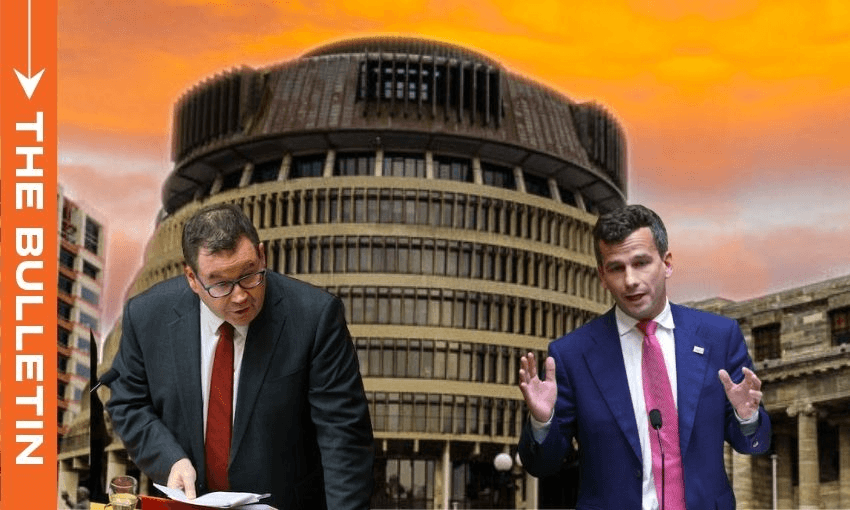Kiri Allan’s exit from politics has prompted calls to “do better” on mental health but how realistic is that in an environment described as highly stressful and combative, asks Anna Rawhiti-Connell in this excerpt from The Bulletin, The Spinoff’s morning news round-up. To receive The Bulletin in full each weekday, sign up here.
We can have compassion and hold people accountable
Kiri Allan announced yesterday that she would not be standing for reelection at the next election saying that she needed to “step out of the arena”, “take time out to heal” and “chart a new course for my life”. Allan said she was so, so sorry for undermining the prime minister and for letting the party, her colleagues and her constituents down. This morning Mental Health Foundation CEO Shaun Robinson has written an excellent reflection for us on The Spinoff on what we can learn from the response to Allan’s exit to date. I am grateful for it and I’m sure many others will be too. I have always found the way we toss about the phrase “mental health” frustrating. It’s great we can talk about it but it’s become a catch-all for too much and ignores a spectrum that ranges from the garden variety “looking after your mental wellbeing” to severe mental illness. Repeated use of the phrase without nuance or clarity gives it the quality of wallpaper we end up ignoring. As Robinson writes, recent events have “exposed difficulties New Zealanders have talking about mental health and responding to a person’s actions in the context of their mental state.” Robinson writes that “we can have compassion” and still hold Allan “to a high standard of behaviour. Not holding Allan accountable is in fact stigmatising mental distress – especially for people who manage long-term mental illness.”
Urgent debate a “shameful” politicisation of mental health
Yesterday Act leader David Seymour called for an urgent debate in the House about Kiri Allan’s resignation. He stands accused of politicising mental health. While acknowledging that parliament is a very unique place of work, it is difficult to imagine any other place of work where an open debate about your behaviour and state of mind would take place the way it did about Allan’s yesterday. Grant Robertson spoke hopefully and compassionately in a speech that contained echoes of Jacinda Ardern’s valedictory speech. “My reflection is that, as a group of people here, we are stronger and better for the diversity that is in this house. We are stronger and better for making sure that people can see a career in politics even if they’re not perfect,” he said. He went on to say that he thought politicians could do better in ensuring that people with diverse backgrounds, “including struggles with mental health” could have careers in politics.
Parliament ‘a human pressure cooker’
While there’s been pushback about the instigation of the debate and the use of Allan’s exit from politics as a means to have a crack at the government, the mere fact that it happened makes you wonder if the idea of parliament “doing better” is even possible. It’s an institution propped up by conventions that constantly excuse it from behaviour most would describe as acceptable. It’s “highly stressful” and a “bloodsport”. Commentary about politicising things is often rooted in questions of timing. “Not now, mate”, rather than not ever. Just this morning former MP Gareth Hughes asks whether parliament is a human pressure cooker making people’s struggles worse. I can remain hopeful and cynical at the same time but the chances of Kiri Allan’s exit being a watershed moment currently seem unlikely.
The possibility of public dissent within the ranks
Party unity and party loyalty will frequently trump the aspirations and needs of the individual in New Zealand’s current political environment. Winning an election is a collective effort. It’s not directly related to the conversations about mental health and politics but there are parallels in some of what’s been written about dissension from David Parker about Chris Hipkins’ decision to scrap a wealth tax. There is an idealism about a diversity of people being welcomed into a career in politics and there is an idealism in the idea that publicly expressing principled and diverse views that differ from the party line can be embraced. Then there’s the reality of how that is perceived in the run-up to an election. The Herald’s Thomas Coughlan covers the former in a really interesting piece (paywalled) about the possibility of public disagreement within parties. The Herald’s Claire Trevett (paywalled) covers the reality of the way it will be perceived and exploited “at a time when discipline and a single song sheet is very important.”


